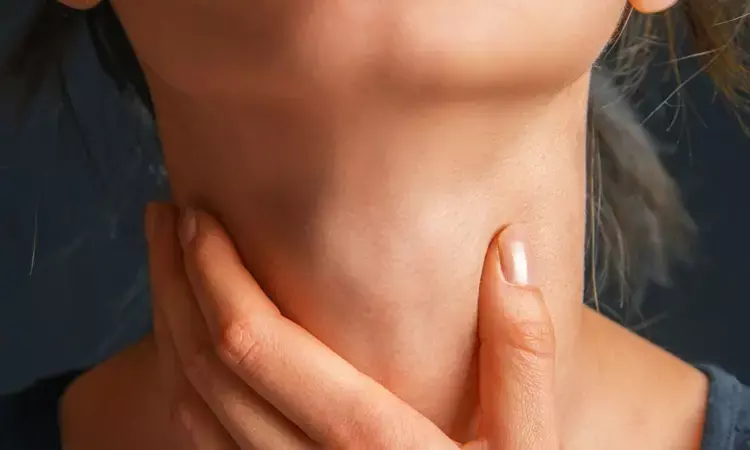- Home
- Medical news & Guidelines
- Anesthesiology
- Cardiology and CTVS
- Critical Care
- Dentistry
- Dermatology
- Diabetes and Endocrinology
- ENT
- Gastroenterology
- Medicine
- Nephrology
- Neurology
- Obstretics-Gynaecology
- Oncology
- Ophthalmology
- Orthopaedics
- Pediatrics-Neonatology
- Psychiatry
- Pulmonology
- Radiology
- Surgery
- Urology
- Laboratory Medicine
- Diet
- Nursing
- Paramedical
- Physiotherapy
- Health news
- Fact Check
- Bone Health Fact Check
- Brain Health Fact Check
- Cancer Related Fact Check
- Child Care Fact Check
- Dental and oral health fact check
- Diabetes and metabolic health fact check
- Diet and Nutrition Fact Check
- Eye and ENT Care Fact Check
- Fitness fact check
- Gut health fact check
- Heart health fact check
- Kidney health fact check
- Medical education fact check
- Men's health fact check
- Respiratory fact check
- Skin and hair care fact check
- Vaccine and Immunization fact check
- Women's health fact check
- AYUSH
- State News
- Andaman and Nicobar Islands
- Andhra Pradesh
- Arunachal Pradesh
- Assam
- Bihar
- Chandigarh
- Chattisgarh
- Dadra and Nagar Haveli
- Daman and Diu
- Delhi
- Goa
- Gujarat
- Haryana
- Himachal Pradesh
- Jammu & Kashmir
- Jharkhand
- Karnataka
- Kerala
- Ladakh
- Lakshadweep
- Madhya Pradesh
- Maharashtra
- Manipur
- Meghalaya
- Mizoram
- Nagaland
- Odisha
- Puducherry
- Punjab
- Rajasthan
- Sikkim
- Tamil Nadu
- Telangana
- Tripura
- Uttar Pradesh
- Uttrakhand
- West Bengal
- Medical Education
- Industry
Autoantibodies fail to influence reproductive parameters in patients with Hashimoto thyroiditis, reports research

A new study published in the journal of Endocrine Research found that autoantibodies had no effect on reproductive characteristics, despite a mild correlation observed among thyroid volume, preterm deliveries and the quantity of antithyroid peroxidase (TPOAb).
Among autoimmune diseases, Hashimoto's thyroiditis (HT) is the most common where the thyroid stimulating hormone (TSH) levels are up, serum free thyroxine (FT4) levels are low, anti-thyroid autoantibodies like TPOAb and anti-thyroglobulin (TGAb) are present, and there is local parenchymal lymphocytic infiltrate. According to studies, eutrophic women with thyroid autoimmunity (TAI) have a greater risk of pregnancy morbidity and loss. Also, inflammatory processes of viral/bacterial origin and autoimmune have been identified as influencing cellular structures at the maternal-fetal interface and determining various abnormalities in the product of conception. Research of the role of TAI in infertility and assisted reproduction results in women without dysfunction found that TAI had no effect on the number of oocytes retrieved, the chance of fertilization, implantation or clinical pregnancy.
In order to assess the presence as well as concentration of antithyroglobulin (TGAb) antibodies and antithyroid peroxidase at the onset of Hashimoto's thyroiditis (HT) as well as their correlation with disease attributes and reproductive parameters both before and after diagnosis, Rafaela and colleagues conducted this study.
A total of 65 women with HT were included in this cross-sectional research, which was conducted in an outpatient clinic. Medical records were reviewed and interviews were conducted to gather data. The factors included illness features, TPOAb and TGAb levels, live births, preterm births, infertility and pregnancy losses. This research employed Spearman correlation, Mann-Whitney test, and chi-square or Fisher's exact tests.
The average age upon diagnosis was 38 (SD ± 11.1) years, and the disease lasted for 7.5 (SD ± 5.3) years. Of the women, 46% had spells of infertility. Also, 42 women (64.6%) had TGAb antibodies and 59/65 (90.7%) had TPOAb antibodies. Comparison between the groups with and without TPOAb or TGAb revealed no variations in any of the examined variables. TPOAb concentration was strongly connected with thyroid volume and preterm deliveries, whereas TGAb concentration was correlated with age.
Overall, the findings of this study found that among women with HT, infertility was highly prevalent. This was greater than the whole population, but there was no indication that the concentration or existence of the autoantibodies TGAb and TPOAb had any bearing on it.
Source:
de Souza, R. S. X., Quintino-Moro, A., Engelbrecht Zantut-Wittmann, D., & Fernandes, A. (2024). Antithyroid Antibodies and Reproductive Parameters of Women with Hashimoto’s Thyroiditis. In Endocrine Research (pp. 1–8). Informa UK Limited. https://doi.org/10.1080/07435800.2024.2405147
Neuroscience Masters graduate
Jacinthlyn Sylvia, a Neuroscience Master's graduate from Chennai has worked extensively in deciphering the neurobiology of cognition and motor control in aging. She also has spread-out exposure to Neurosurgery from her Bachelor’s. She is currently involved in active Neuro-Oncology research. She is an upcoming neuroscientist with a fiery passion for writing. Her news cover at Medical Dialogues feature recent discoveries and updates from the healthcare and biomedical research fields. She can be reached at editorial@medicaldialogues.in
Dr Kamal Kant Kohli-MBBS, DTCD- a chest specialist with more than 30 years of practice and a flair for writing clinical articles, Dr Kamal Kant Kohli joined Medical Dialogues as a Chief Editor of Medical News. Besides writing articles, as an editor, he proofreads and verifies all the medical content published on Medical Dialogues including those coming from journals, studies,medical conferences,guidelines etc. Email: drkohli@medicaldialogues.in. Contact no. 011-43720751


